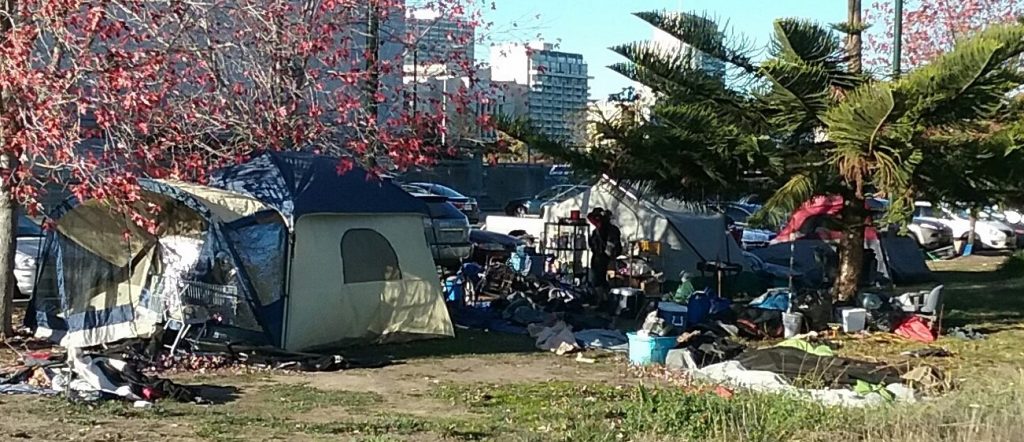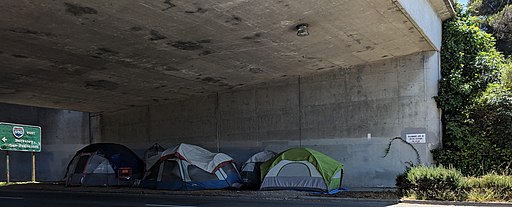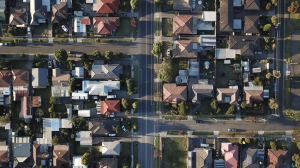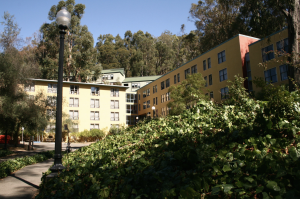By Amanda McRae
Annie is a 49-year-old mother living out of a tent in Berkeley, CA. She moves her tent on her own a few times a week to keep the Berkeley Police Department off of her back, despite barely having the muscle strength to stand upright easily. She confided in me that she struggles with Bipolar Disorder and Schizophrenia, diagnosed when she was only 19. She had a daughter when she was 27, who was put into the foster care system immediately. Annie doesn’t know where she is today.
Annie has been homeless on and off throughout her life- sometimes seeking refuge in shelters, other times living out of her car and parking in the lots of grocery stores and gas stations. She sold her car to feed herself and her cat a few years ago. Annie is not alone- she is one of millions of homeless Californians who suffer from mental illness and do not have the resources or personal safety to get treatment. For perspective, more than a quarter of the homeless population in Los Angeles struggles with mental illness. Annie showed me around her tent. It is mostly full of what many consider to be trash, but she is proud of her old cans and papers- to her, they are possessions. When I spoke with Annie, she seemed self-aware. She knew that her situation was not ideal, but she also was pessimistic about any viable alternatives. The November 2018 ballot included a measure which would be able to help Annie and others in her position in securing housing and treatment.
California residents voted to approve a ballot measure referred to as Proposition 2 or “There’s No Place Like Home,” which authorized the creation of bonds to fund existing housing programs for individuals with mental illness. The bill requires certain stipulations for these housing facilities: counselors, case management, and other supportive services. This program is an extension of Proposition 63, passed in 2004.
Proposition 63, colloquially referred to as the “Millionaire’s Tax”, enacted a 1 percent tax increase on individuals with personal incomes over 1 million dollars. This tax is used to fund mental health programs and the money is distributed to participating counties across California. 80 percent of the allocation is used to treat severe patients, and the remaining amount focuses on preventative care. It was the first measure in many years which allowed for the California Department of Mental Health to increase funding and resources. The proposed housing program suggested in November’s Proposition 2 vote comes directly from the previously enacted “Millionaire’s tax.” This means that the measure has no impact on individuals outside of that bracket, and would not further increase taxes, even to those who fall into that category.
This proposition was an interesting case: typically voters are not involved with revenue bonds, and these allocations can be enacted within the existing government framework. However, as this proposition allocates money from a previous ballot measure (Proposition 63) it had to be voted on by the general public. The bill was controversial, mainly due to fear of open and reckless interpretation of mental illness. Opponents argued that this bill could be interpreted or expanded to include other people who are living on the streets with issues such as drug addiction, arguing that housing is not a solution. People who suffer from these illnesses will be wandering the streets, even if they have a housing unit to return to. Or, alternatively, that these people will shut themselves inside their units, refuse treatment, and worsen from lack of contact with the outside world. Proponents argued that other forms of treatment cannot be effective without security. Financially, the homeless population still utilizes emergency psychiatric services- such as inpatient beds in hospitals- costs which surpass traditional treatment costs.
This measure and its predecessor in 2004 represent a step towards including mental health as an aspect of healthcare that a state should take responsibility for. There is no denying that the conversation surrounding mental health has taken center stage when it once was hidden away. As more and more people in the public eye come forward with their own struggles and disabilities- we see that treatment is a socioeconomic problem more than an issue of ineffectiveness.
Since this proposition was a call for reallocation within an existing budget, I argued that it should be given the chance to prove its effectiveness or lack thereof. Until we attempt a solution like this, there is no way to understand its impact. I look forward to seeing the change created by the passing of 2018’s Proposition 2, and am hopeful for all the lives it will impact.

References:
KFSN. “2018 VOTER GUIDE: A Look at California’s Proposition 2.” ABC30 Fresno, 8 Oct. 2018, abc30.com/politics/2018-voter-guide-a-look-at-californias-proposition-2/4441427/. Matthews, Alex Leeds. “Money For Housing Californians With Mental Illness Heads To Ballot Box.” California Healthline, 30 July 2018, CLICK HERE TO VIEW.








Be First to Comment